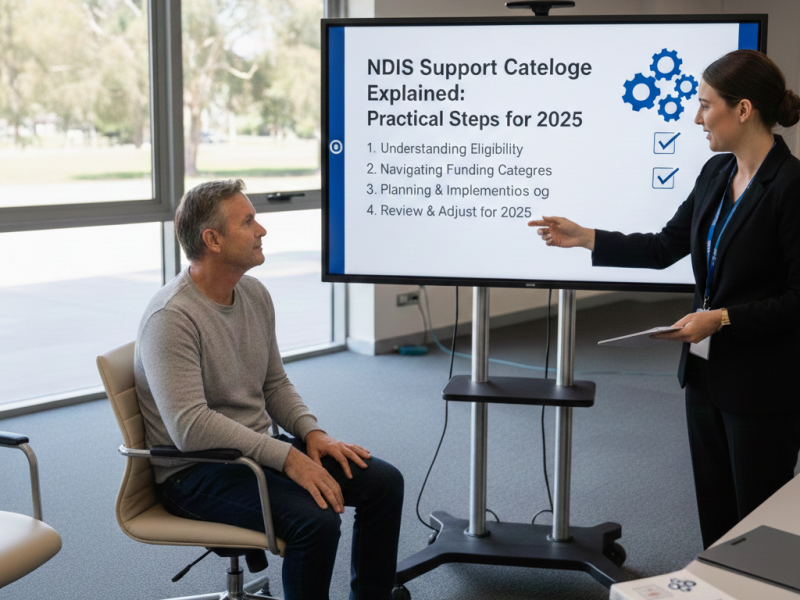The Social, Community, Home Care and Disability Services Industry Award 2010 (SCHADS Award) is one of the most important industrial awards in the care sector; regulating the terms and conditions of employment for workers in social, community, home care, and disability support roles in Australia. The SCHADS Award determines minimum wage rates, hours of work, allowances, and leave entitlements; and is a vital area of understanding for Provider businesses.
The Scope of the SCHADS Disability Services Industry Award
The SCHADS Award applies to work performed in the social and community services, home care, crisis accommodation and supported housing, and family day care scheme sectors. In disability services, this typically includes roles that deliver or support NDIS-funded services. Where another modern award or an enterprise agreement clearly covers an employee, that instrument will usually apply instead of the SCHADS Award.
Employees Covered under the SCHADS Award
Staff covered by the SCHADS Award generally include workers in occupations involving direct support and care for clients, such as disability support workers, personal care workers, community support workers, allied health assistants whose duties align with SCHADS classifications, and social and community services roles like intake, case management, and program support. Administrative and supervisory personnel may also be covered where their duties fall within the Award’s classification definitions for the business operations in these sectors. Casual employees are covered by the SCHADS Award and receive the applicable casual loading and minimum engagement provisions.
Want to Attract More NDIS Clients?
Get expert advice on how to market your services, connect with clients, and grow your practice.
Employees Excluded from the SCHADS Award
The SCHADS Award does not apply where an approved enterprise agreement or another specific modern award covers the role (for example the Aged Care Award 2010, Health Professionals and Support Services Award 2010, Nurses Award 2010). It also does not cover independent contractors, senior managerial or executive employees who fall outside the Award’s classification structure, or employees whose work is wholly outside the social, community, home care, or disability service industries.
Understanding SCHADS Award Classifications and Pay Levels with Proper Illustrations
The SCHADS Award uses a classification system that groups roles by the complexity of duties, required skills, and level of responsibility.
- Level 1 roles often involve routine tasks under direct supervision, like basic domestic assistance and straightforward personal care.
- Level 2 roles reflect growing skill and judgment, such as assisting with activities of daily living and community participation.
- Level 3 typically includes more complex support, coordination, or administrative responsibilities.
- Level 4 and above usually captures specialist or supervisory work, team leadership, and higher-level accountability.
Pay points within levels recognise experience and competency progression over time or with additional qualifications. Accurate classification is based on the duties performed in practice, not just job titles.
Standard Working Hours and Allocated Days Off
Under the SCHADS Award, ordinary hours for full-time employment are generally 38 hours per week, which can be arranged over a roster cycle by agreement. Part-time and casual engagements must comply with minimum engagement periods and roster rules. Employees are entitled to appropriate rest and meal breaks during shifts, as well as regular days off each week or over the relevant roster cycle. Rosters should be set and changed in accordance with the notice requirements in the Award, supporting predictable work patterns and work-life balance.
Exclusive Allowances, Leave, Overtime, Shift Work
The SCHADS Award includes a range of allowances that commonly arise in disability services, such as first aid, uniform and laundry, broken shift, sleepover, and vehicle or travel allowances where applicable. Employees are entitled to leave under the National Employment Standards and the Award, including annual leave, personal/carer’s leave, and compassionate leave, with additional provisions for public holidays. Overtime applies where hours exceed ordinary hours or rostered parameters, and penalty rates apply for weekends, public holidays, and certain shift patterns. Where an employee qualifies as a shiftworker under the Award, additional loadings or entitlements may apply.
Termination of Employment
Termination of employment must comply with the National Employment Standards and the SCHADS Award requirements, including providing the correct notice period or payment in lieu where applicable. Redundancy entitlements may apply depending on the organisation’s size and the employee’s service. Employers should manage consultation and documentation carefully to reduce the risk of unfair dismissal or adverse action claims.
Overcoming Common Issues under SCHADS Award Compliance
Common issues include misclassifying roles, underpaying minimum engagements, misapplying penalty rates for evenings, weekends, and public holidays, and overlooking paid travel time between clients during a shift. Providers can reduce risk by classifying roles against the Award’s duty descriptors, setting clear part-time agreements, recording all hours accurately, auditing rosters and payslips regularly, and reviewing Award updates each year alongside the Annual Wage Review.
Understanding Higher-Level Duties and Responsibilities
Senior-level positions within SCHADS Award grades typically involve supervising teams, coordinating service delivery, ensuring compliance with workplace and sector requirements, overseeing risk and incident processes, and contributing to program quality and client outcomes. These higher responsibilities are reflected in higher classifications and pay points and often require demonstrated competencies, experience, and leadership capability.
Referrals Start With Reputation – We’ll Help You Build Both
From networking tips to service refinement, we guide NDIS providers toward lasting impact.
Conclusion
The Social, Community, Home Care and Disability Services Industry Award 2010 (SCHADS Award) is critical to fair and compliant employment in disability and community services. Understanding its scope, classifications, hours and rostering rules, allowances, and entitlements helps employers and employees set clear expectations, reduce compliance risk, and support stable service delivery. Providers should review classifications, rosters, and pay settings regularly and seek professional advice for complex scenarios.
FAQ’s
1. What is the SCHADS Award?
The SCHADS Award is the modern industrial award that sets minimum wages and conditions for workers in the social, community, home care, and disability service industries, including rules for classifications, rosters, allowances, overtime, and penalties.
2. Who is entitled to the SCHADS Disability Services Industry Award?
It applies to workers whose duties fall within SCHADS classifications in disability and community services, such as disability support workers, personal care workers, community support staff, and certain supervisory or administrative roles tied to service delivery.
3. Are there any workers who are excluded from the SCHADS Award?
Yes. Employees covered by another modern award or an enterprise agreement are generally excluded, as are senior managerial or executive roles outside the classification structure and independent contractors. Roles wholly outside the covered industries are also excluded.
4. How are SCHADS Award classifications and pay points allocated?
Classifications are based on the actual duties, skills, and responsibility of the role. Pay points recognise experience and competency within a level. Employers should map duties to the Award descriptors and then apply the corresponding pay rates.
5. What allowances and entitlements are provided under the SCHADS Award?
Common allowances include first aid, uniform and laundry, broken shift, sleepover, and vehicle or travel where applicable. Entitlements include annual leave, personal/carer’s leave, overtime when ordinary hours are exceeded, and penalty rates for weekends, public holidays, and qualifying shiftwork.
6. What are the measures employers can adopt to ensure SCHADS Award compliance?
Classify roles accurately against the Award, put clear part-time work patterns in writing, track hours and travel between clients, apply the correct penalties and allowances, audit rosters and payslips, and review Award updates and annual wage changes.
7. Why is SCHADS Award compliance critical to NDIS and aged care providers?
Compliance supports fair treatment of workers, improves retention and service continuity, aligns with funding and audit expectations, and helps providers avoid back-payments, penalties, and reputational damage.


